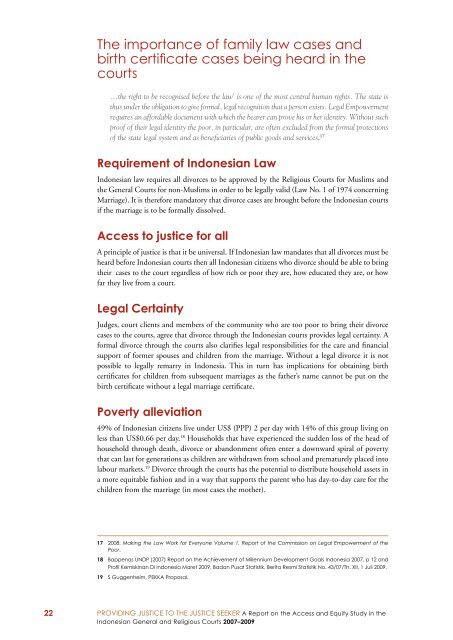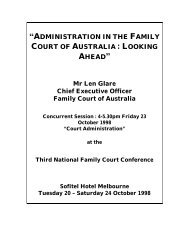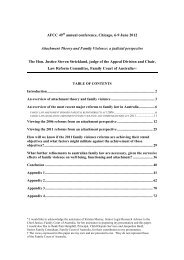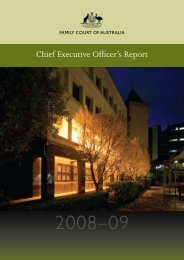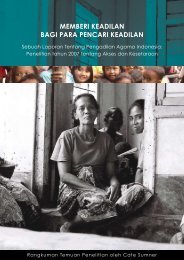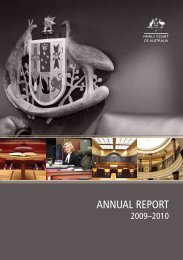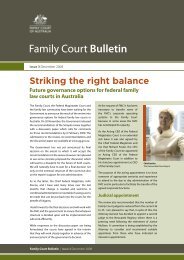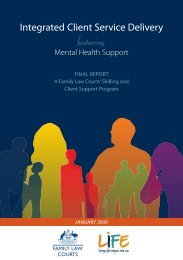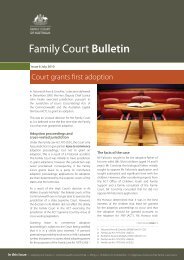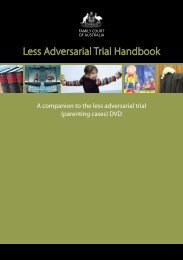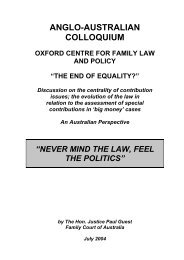Providing Justice to the Justice Seeker: - Family Court of Australia
Providing Justice to the Justice Seeker: - Family Court of Australia
Providing Justice to the Justice Seeker: - Family Court of Australia
- No tags were found...
Create successful ePaper yourself
Turn your PDF publications into a flip-book with our unique Google optimized e-Paper software.
The importance <strong>of</strong> family law cases andbirth certificate cases being heard in <strong>the</strong>courts…<strong>the</strong> right <strong>to</strong> be recognised before <strong>the</strong> law’ is one <strong>of</strong> <strong>the</strong> most central human rights. The state isthus under <strong>the</strong> obligation <strong>to</strong> give formal, legal recognition that a person exists. Legal Empowermentrequires an affordable document with which <strong>the</strong> bearer can prove his or her identity. Without suchpro<strong>of</strong> <strong>of</strong> <strong>the</strong>ir legal identity <strong>the</strong> poor, in particular, are <strong>of</strong>ten excluded from <strong>the</strong> formal protections<strong>of</strong> <strong>the</strong> state legal system and as beneficiaries <strong>of</strong> public goods and services. 17Requirement <strong>of</strong> Indonesian LawIndonesian law requires all divorces <strong>to</strong> be approved by <strong>the</strong> Religious <strong>Court</strong>s for Muslims and<strong>the</strong> General <strong>Court</strong>s for non-Muslims in order <strong>to</strong> be legally valid (Law No. 1 <strong>of</strong> 1974 concerningMarriage). It is <strong>the</strong>refore manda<strong>to</strong>ry that divorce cases are brought before <strong>the</strong> Indonesian courtsif <strong>the</strong> marriage is <strong>to</strong> be formally dissolved.Access <strong>to</strong> justice for allA principle <strong>of</strong> justice is that it be universal. If Indonesian law mandates that all divorces must beheard before Indonesian courts <strong>the</strong>n all Indonesian citizens who divorce should be able <strong>to</strong> bring<strong>the</strong>ir cases <strong>to</strong> <strong>the</strong> court regardless <strong>of</strong> how rich or poor <strong>the</strong>y are, how educated <strong>the</strong>y are, or howfar <strong>the</strong>y live from a court.Legal CertaintyJudges, court clients and members <strong>of</strong> <strong>the</strong> community who are <strong>to</strong>o poor <strong>to</strong> bring <strong>the</strong>ir divorcecases <strong>to</strong> <strong>the</strong> courts, agree that divorce through <strong>the</strong> Indonesian courts provides legal certainty. Aformal divorce through <strong>the</strong> courts also clarifies legal responsibilities for <strong>the</strong> care and financialsupport <strong>of</strong> former spouses and children from <strong>the</strong> marriage. Without a legal divorce it is notpossible <strong>to</strong> legally remarry in Indonesia. This in turn has implications for obtaining birthcertificates for children from subsequent marriages as <strong>the</strong> fa<strong>the</strong>r’s name cannot be put on <strong>the</strong>birth certificate without a legal marriage certificate.Poverty alleviation49% <strong>of</strong> Indonesian citizens live under US$ (PPP) 2 per day with 14% <strong>of</strong> this group living onless than US$0.66 per day. 18 Households that have experienced <strong>the</strong> sudden loss <strong>of</strong> <strong>the</strong> head <strong>of</strong>household through death, divorce or abandonment <strong>of</strong>ten enter a downward spiral <strong>of</strong> povertythat can last for generations as children are withdrawn from school and prematurely placed in<strong>to</strong>labour markets. 19 Divorce through <strong>the</strong> courts has <strong>the</strong> potential <strong>to</strong> distribute household assets ina more equitable fashion and in a way that supports <strong>the</strong> parent who has day-<strong>to</strong>-day care for <strong>the</strong>children from <strong>the</strong> marriage (in most cases <strong>the</strong> mo<strong>the</strong>r).17 2008, Making <strong>the</strong> Law Work for Everyone Volume 1, Report <strong>of</strong> <strong>the</strong> Commission on Legal Empowerment <strong>of</strong> <strong>the</strong>Poor.18 Bappenas UNDP (2007) Report on <strong>the</strong> Achievement <strong>of</strong> Millennium Development Goals Indonesia 2007, p 12 andPr<strong>of</strong>il Kemiskinan Di Indonesia Maret 2009, Badan Pusat Statistik, Berita Resmi Statistik No. 43/07/Th. XII, 1 Juli 2009.19 S Guggenheim, PEKKA Proposal.22 <strong>Providing</strong> <strong>Justice</strong> <strong>to</strong> <strong>the</strong> <strong>Justice</strong> <strong>Seeker</strong> A Report on <strong>the</strong> Access and Equity Study in <strong>the</strong>Indonesian General and Religious <strong>Court</strong>s 2007–2009


